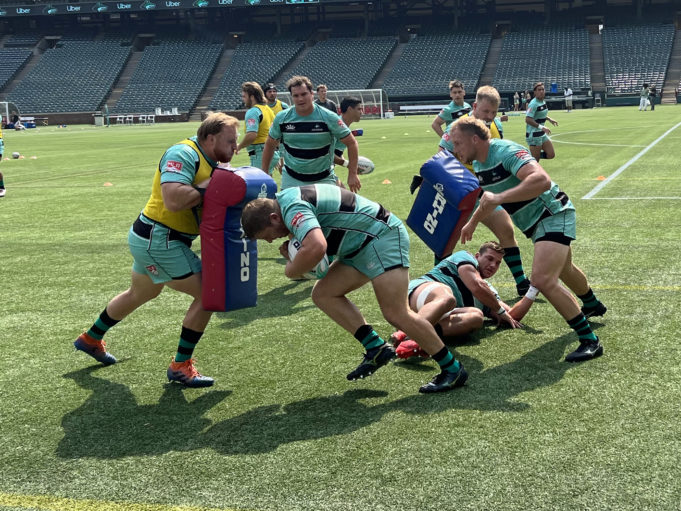The city of Coventry, located some 15 miles from the town of Rugby, has no team in its country’s top flight in the sport named for its neighbor.
Tarrant County, however, hosts a professional rugby team in Arlington’s Choctaw Stadium. Known as the Dallas Jackals, they play as a member of Major League Rugby, the highest-level club competition in the United States.
The seeming oddity speaks to the paradigm shifts happening right now in the world of sport. And this sport in particular, is no stranger to upheaval.
The squad known as Wasps had played in the Premiership, England’s highest level of rugby union, in Coventry up until this season when they entered administration (Americans call it bankruptcy). The club itself dates to 1866, playing in the country where the rugby code of football originated (by custom in 1822 at Rugby School). Their history includes four Premiership titles and two European titles. That sounds like tradition, and, indeed it is. But it’s not quite as straightforward as what might come to mind when we think about, say, the five-time World Series Champion Cincinnati Reds, who trace their own history to 1876.
To be sure, the Reds have enjoyed unusual stability in the sports world, managing to remain a viable business entity in the same city for well over a century. They’re helped by belonging to one of the big four U.S. leagues. Rugby, despite being one of the world’s most popular sports, has not always had the same consistency. Some examples:
- 1895: The sport of rugby splits into two codes, Rugby Union and Rugby League, amidst a debate over professionalism. Rugby Union, a 15-players-a-side version (League uses 13), continues as the more popular, but amateur, side of the game.
- 1980s: England’s Rugby Union governing bodies finally agree to form an actual league (no, not the sport of Rugby League, just a, you know, organization with standings and regularly-scheduled contests).
- 1995: Rugby Union finally professionalizes worldwide.
- After 1995: Lots of fits and starts trying to create stable professional circuits.
- Since Forever, Basically: The world’s rugby fans have wondered when the U.S., with all its commercial might, population, and affection for collision sports, would become a power in the sport.
On the latter point, Major League Rugby is trying to effect change. It’s already the most successful attempt at establishing a professional presence for the game stateside. Saturday’s game between Dallas and Chicago, meaningless in terms of the standings, might actually demonstrate some of its positives.
Chicago won 29-28. While the game was a sloppy one (including multiple red-card disqualifications for each team), it stayed close throughout. The home team narrowly missed a long penalty kick in the waning minutes that might have secured four more standings points. To be sure, those points in this season-ending game wouldn’t have really mattered. Each team had just two wins coming in, with playoff hopes long dashed. Ironically that very meaninglessness potentially enhances the league’s stability.
Historically, the loser of a game like this in a rugby competition in some other countries might have faced the possibility of dropping to a lower-level league for the next season. That adds meaning but also instability. Relegation won’t happen in MLR or in any of the other big American sports leagues. That’s no guarantee against a fate like the one Wasps suffered (I still have paperwork from when the Texas Rangers, who, at the time, played in the Jackals’ current facility, declared bankruptcy). But it helps.
The Premiership team in Worcester, England also failed this past season and London Irish did so this month. Both had mostly found themselves in the bottom half of the table after being promoted from the second-tier Championship and found it tough to keep up with some of the bigger clubs. And, indeed, Wasps, for much of their history, had been based in London. They had relocated to the Midlands less than ten years ago trying to better themselves economically.
The premiership modified its system during the pandemic to preclude relegation. After this coming season, however, rises and drops are scheduled to return. The clubs in the Championship are concerned it may not. The possibility of promotion matters to them for competitive reasons but especially for economic ones.
Promotion/relegation happens in non-U.S. soccer leagues (or association football as it’s known in most countries). The San Francisco 49ers just bought newly-relegated Leeds, paying much less than they would have if the franchise had remained in the Premier League.
Playing the best competition certainly helps game attendance and merchandise sales, but a huge part of the economics for teams has to do with media dollars. Neither the Premiership nor MLR can command the types of rights fees soccer, Formula 1, or the big American sports get. But even the major players’ stability might not be what it once was.
In July, the Reds are scheduled to receive a payment from their longtime cable television partner, Bally Sports Ohio. Their receipt of those funds is by no means a sure thing. The network’s parent company has entered administration – er, bankruptcy – proceedings and has skipped payments in some MLB deals. For years, local TV rights have provided a reliable source of revenue for baseball teams, and have been more important to their finances than to other sports, who have relatively more lucrative national and international rights agreements. If the Reds and other teams lose their sizable rights deal – and some will, because the number of cable subscribers has dropped too far to justify the previous dollar figures – they’ll have to rethink their operations. It might not mean a complete reorganization, but, then again, it might.
In England, teams don’t do local broadcast deals. That has a lot to do with the structure of the broadcasting industry, which features primarily national broadcasters. The Premiership signed a new TV deal last year that will hopefully help its clubs. But the sport’s authorities have to figure out a sustainable model overall, addressing issues like salary caps and, yes, promotion and relegation.
The bottom line is that a rugby team in its second year, with a total of two wins in its history (the Jackals went winless in their inaugural campaign) might have more staying power than clubs who have been around for more than a century (as a fan of the sport, I would, of course, like them all to succeed). To be sure, MLR has not had overwhelming attendance or revenue numbers. But they have a FOX TV deal in place and are seeking additional investment to strengthen their position. In 2031, the U.S. will host the men’s Rugby World Cup (and the women’s in 2033). If the league can last until then, the spectacle might provide momentum the way the 1994 World Cup did for Major League Soccer.
The good news is that live sports have more value than ever in a fragmented media landscape. That helps niche sports, and rugby fans offer impressive income demographics that appeal to many advertisers. So while we don’t really know how things will shake out for rugby (or baseball or any other sport for that matter), we can be sure that the ability to adjust to the changing landscape will matter a great deal.












